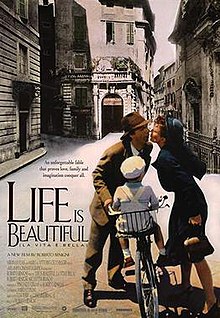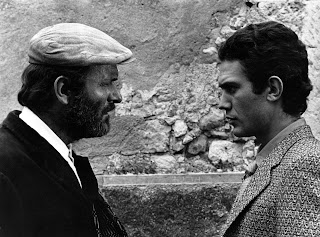Narrator of Oscar-winning Life is Beautiful enjoyed long and successul career
 |
| Omero Antonutti had success on screen and as a stage actor |
His most acclaimed performance came in Padre padrone, a 1977 film directed by Paolo and Vittorio Taviani, a Palme d’Or winner at Cannes that was considered by many critics to be the co-directing brothers’ finest work.
Antonutti worked with the Taviani brothers again on La notte di San Lorenzo (1982), which won the Grand Prix du Jury at Cannes, and Kaos (1984) in which he took the part of the playwright Luigi Pirandello in a film based on some of Pirandello’s own short stories.
He was often asked to portray significant figures in dramatisations of real-life events. For example, he took the part of Roberto Calvi, the ill-fated chairman of the Banco Ambrosiano in the Giuseppe Ferrara’s 2002 feature The Bankers of God: The Calvi Affair, and played the shady Sicilian banker Michele Sindona in Michele Placido’s 1995 film Un eroe borghese - A Bourgeois Hero. In Piazza Fontana: The Italian Conspiracy, directed by Marco Tullio Giordano in 2012, Antonutti was cast as the Italian president, Giuseppe Saragat.
At the same time, his strong, deep voice meant his skills were in big demand as a voice dubber, with Italian cinema and television audiences preferring international productions to be voiced over by Italian actors, rather than have the visual experience spoiled by subtitles.
Antonutti was the Italian voice of Christopher Lee in the Lord of the Rings series, Sleepy Hollow, The Hobbit and other films. He voiced over Michael Gambon in The King’s Speech, Christopher Plummer in The Mystery of the Templars - National Treasure and Millennium - The Girl with the Hatred, and John Hurt in V for Vendetta. Omar Sharif, Robert Duvall, Donald Sutherland and Rutger Hauer were others whose words were interpreted by Antonutti.
 |
| Antonutti's voice can be heard as the narrator in Life is Beautiful |
As a young man, Antonutti lived in Trieste, the port city on the border of Italy and Slovenia. He found work in the shipyards but acted in his spare time, in the late 1950s appearing in the shows of the Silvio D’Amico Acting School before joining the company of the Teatro Stabile di Trieste.
His first film part came in 1966, when he appeared in Le piacevoli notte - Pleasant Nights, a trilogy of comedic tales set in the Middle Ages directed by Luciano Lucignani, acting in the illustrious company of Ugo Tognazzi, Gina Lollobrigida and Vittorio Gassman.
But it was not until the 1970s that his big screen career began in earnest. After landing a part in La donna della domenica (1975), the dramatisation of a popular murder mystery starring Marcello Mastroianni and Jacqueline Bisset and directed by Luigi Comencini, it was only two years before the Taviani brothers cast him as Efisio Ledda, the despotic father of Gavino Ledda in Padre Padrone, based on the semi-autobiographical novel of the same title by Gavino Ledda, which describes the way Efisio refused to let his son attend elementary school in the 1940s and forced him instead to work on the family sheep farm in Sardinia, which meant he grew up illiterate.
The acclaim Antonutti received for the dramatic intensity of his portrayal of Efisio set him up for a long career in the cinema, part of which he spent in Spain, where his life is commemorated at the Valencia Film Festival.
 |
| Antonutti (left) played opposite Saverio Marconi in the Taviani brothers' Padre Padrone |
In his 50-plus years as a movie and television actor, Antonutti never forgot his theatrical roots. He often returned to the Teatro Stabile in Trieste, taking part whenever a milestone was celebrated in the theatre’s history and occasionally even accepting a part in a play, such was his love of acting in its purest form, on stage in front of a live audience.
Sadly, he did not live long enough to witness the release of his final film. In declining health for a number of years, he died from cancer in November 2019 at the Ospedale Civile in Udine where he was receiving treatment.
Antonutti had spent the final 10 years of his life with his wife, Graziella, whom he married in 2009. His funeral took place at the Chiesa di Sant'Antonio Nuovo in Trieste.
 |
| The Loggia del Lionello is one of the architectural features of Udine's Piazza della Libertà |
Udine, the nearest city to Antonutti’s home village of Basiliano, is an attractive and wealthy provincial city, known as the gastronomic capital of Friuli. Udine's most attractive area lies within the mediaeval centre, which has Venetian, Greek and Roman influences. The main square, Piazza della Libertà, features the town hall, the Loggia del Lionello, built in 1448–1457 in the Venetian-Gothic style, and a clock tower, the Torre dell’Orologio, which is similar to the clock tower in Piazza San Marco - St Mark's Square - in Venice. Long regarded as something of a hidden gem, Udine does not attract the tourist traffic of other, better-known Italian cities, yet with its upmarket coffee shops, artisan boutiques and warm, traditional eating places in an elegant setting, it has much to commend it.
.jpeg) |
| Trieste's Canal Grande is overlooked by the Chiesa di Sant'Antonio Nuovo |
The port of Trieste, tucked away in a bay at the top of the Adriatic sea, is the capital of the Friuli-Venezia Giulia region. Within only a few kilometres of the border with Slovenia to its east and south and less than 30km (19 miles) from the northern border of Croatia, Trieste had been disputed territory for thousands of years and officially became part of the Italian Republic only as recently as 1954. Previously it had been part of the Austro-Hungarian empire and then Yugoslavia, who disputed the border until the Treaty of Osimo in 1975. The area today is one of the most prosperous in Italy and Trieste is a lively, cosmopolitan city and a major centre for trade and ship building. The city has a coffee house culture that dates back to the Habsburg era. Caffè Tommaseo, in Piazza Nicolò Tommaseo, near the grand open space of the Piazza Unità d’Italia, is the oldest in the city, dating back to 1830.
Also on this day:
1486: The birth of celebrated courtesan Imperia Cognati
1530: The death of Florentine military leader Francesco Ferruccio
1546: The death of architect Antonio da Sangallo the Younger
1778: The inauguration of Milan’s Teatro alla Scala




